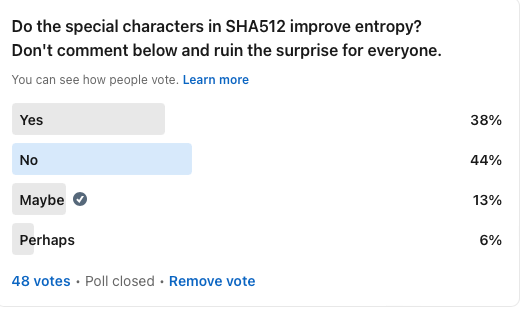Enhancing Password Security Through SHA512 and Entropy
Written on
Chapter 1: Understanding Entropy in Passwords
Entropy, in relation to passwords, signifies the level of randomness or unpredictability, which is vital for their security. Increased entropy implies that a password is less predictable, making it more challenging for attackers to decipher through brute-force attacks or common strategies like dictionary attacks.
Factors Influencing Entropy
- Length: Generally, longer passwords exhibit higher entropy.
- Complexity: Incorporating a variety of uppercase and lowercase letters, digits, and special characters enhances entropy.
- Unpredictability: Passwords that are randomly generated are more secure compared to those that follow predictable patterns, such as simple phrases or sequences.
A password with high entropy is more robust against attacks as it demands more attempts to crack. For example, “P@ssw0rd!” is considerably weaker (lower entropy) than “7g!2B$vKp3X” due to its greater length, complexity, and unpredictability.
Chapter 2: The Importance of Password Hashing
Password hashing is a crucial security measure that safeguards passwords in databases. When you set a password on a website, the system transforms it into a hash via a hashing algorithm, rather than storing it in plain text. This hash is a fixed-length string that uniquely represents your password.
Key Characteristics of Hashing
- Irreversibility: It is computationally impractical to revert a hash back to its original password.
- Uniqueness: A minor alteration in the password results in a completely different hash.
- Consistency: The same password consistently yields the same hash using the same algorithm.
- Security: In case of a data breach, attackers cannot easily recover passwords from hashed values.
Despite its advantages, hashing is not foolproof. Implementing a ‘salt’ (a random value added before hashing) and selecting robust hashing algorithms can significantly improve security. Salting guarantees that even identical passwords produce distinct hashes, preventing the use of pre-computed tables (like rainbow tables) for breaking the hashes.
In conclusion, high entropy in passwords bolsters their defense against guessing and brute-force attempts. Coupled with hashing, particularly when salting is employed, the protection of password data within databases is enhanced, ensuring that even if data is compromised, the passwords remain challenging to retrieve.

What are your thoughts? Do you have anything to contribute? Feel free to engage in discussion.

If you enjoyed this article, explore a compilation of related articles. Don’t forget to support by clapping, subscribing, or becoming a member! If you wish to show your appreciation, consider leaving a tip! For sources, please check a separate page to avoid overwhelming the main content. Also, visit my other publications at history.internetarchaeology.io.
The views expressed in this article reflect solely those of the author.